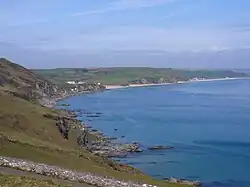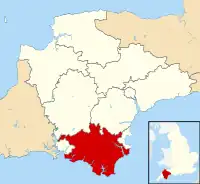South Hams
South Hams is a local government district on the south coast of Devon, England. Its council is based in the town of Totnes, although the largest town is Ivybridge. The district also contains the towns of Dartmouth, Kingsbridge and Salcombe and numerous villages and surrounding rural areas.
South Hams | |
|---|---|
 | |
 South Hams shown within Devon | |
| Coordinates (Totnes): 50°25′53″N 3°41′28″W | |
| Sovereign state | United Kingdom |
| Constituent country | England |
| Region | South West England |
| Non-metropolitan county | Devon |
| Formed | 1 April 1974 |
| Government | |
| • Type | District council |
| • Body | South Hams District Council |
| • HQ | Totnes |
| • Sub-divisions | Civil parishes |
| • UK Parliament | South West Devon Totnes |
| • MPs | Gary Streeter (C) Anthony Mangnall (C) |
| Area | |
| • Total | 342.28 sq mi (886.51 km2) |
| • Rank | Ranked 36th |
| Population (2021) | |
| • Total | 89,213 |
| • Rank | Ranked 266th |
| • Density | 260/sq mi (101/km2) |
| • Ethnicity | 99.09% White |
| ONS code | 18UG |
Much of the district's landscape is recognised for its natural beauty; the north of the district includes part of Dartmoor National Park, the district's coastline and adjoining areas form most of the South Devon Area of Outstanding Natural Beauty, and part of the west of the district lies within the Tamar Valley AONB. The district's coast includes the promontories of Start Point and Bolt Head.
The neighbouring districts are Torbay, Teignbridge, West Devon, Cornwall (across the Tamar–Tavy Estuary) and Plymouth.
Toponymy
"Ham" is an Old English term which can mean a homestead, river meadow or peninsula.[1] The settled farming areas either side of the largely uninhabited wilderness of Dartmoor were anciently termed the "North Hams" and "South Hams" respectively. The name North Hams fell out of general usage, but the name South Hams continued to be used for the area between Dartmoor and the south coast.[2]
History
The South Hams were formerly part of the Brythonic (Celtic) Kingdom of Dumnonia. Post-Roman settlement on coastal promontory hillforts, such as Burgh Island, followed the established pattern of trading (particularly of tin) found across the western Atlantic coastal regions. In the later Anglo-Saxon era, the South Hams was a feudal estate consisting of all of the land between the River Plym and River Dart and south of Dartmoor with the English Channel forming the southern boundary. There is some evidence that Cornish was spoken and understood in the area until the late Middle Ages.[3]
In 1917, the village of Hallsands was abandoned after much of it was lost to the sea following the removal of the shingle bank protecting the shore to help build Devonport dockyard.[4]
In 1944 several villages were evacuated so that training for D-Day could be carried out in secret. The area was chosen because of the resemblance of its beaches to those of Normandy. Preparations were disrupted, and secrecy nearly compromised, by a devastating E-boat attack during Exercise Tiger.
The modern local government district was formed on 1 April 1974 under the Local Government Act 1972, covering the area of seven former districts which were all abolished at the same time:[5]
- Dartmouth Municipal Borough[lower-alpha 1]
- Kingsbridge Rural District
- Kingsbridge Urban District
- Plympton St Mary Rural District
- Salcombe Urban District
- Totnes Municipal Borough
- Totnes Rural District
The new district was named South Hams, using the long-established name for the area.[6]
Governance
South Hams District Council | |
|---|---|
 | |
| Type | |
| Type | |
| History | |
| Founded | 1 April 1974 |
| Leadership | |
Andy Bates since June 2020[8] | |
| Structure | |
| Seats | 31 councillors |
Political groups |
|
| Elections | |
| First past the post | |
Last election | 4 May 2023 |
Next election | 6 May 2027 |
| Meeting place | |
 | |
| Follaton House, Plymouth Road, Totnes, TQ9 5NE | |
| Website | |
| www | |
South Hams District Council provides district-level services. County-level services are provided by Devon County Council.[9] The whole district is also covered by civil parishes, which form a third tier of local government.[10]
In the parts of the district within the Dartmoor National Park, town planning is the responsibility of the Dartmoor National Park Authority. The district council appoints one of its councillors to serve on the 19-person National Park Authority.[11]
Political control
The council has been under Liberal Democrat majority control since the 2023 election.
The first election to the council was held in 1973, initially operating as a shadow authority alongside the outgoing authorities until the new arrangements came into effect on 1 April 1974. Political control of the council since 1974 has been as follows:[12][13]
| Party in control | Years | |
|---|---|---|
| Independent | 1974–1983 | |
| No overall control | 1983–1987 | |
| Conservative | 1987–1995 | |
| No overall control | 1995–1999 | |
| Conservative | 1999–2023 | |
| Liberal Democrats | 2023–present | |
Leadership
The leaders of the council since 1994 have been:[14][15]
| Councillor | Party | From | To | |
|---|---|---|---|---|
| Owen Masters | Conservative | 1994 | 1995 | |
| Doreen Flood | Liberal Democrats | 1995 | 1999 | |
| Owen Masters | Conservative | 1999 | 2001 | |
| Richard Yonge | Conservative | 2001 | 6 May 2007 | |
| John Tucker | Conservative | May 2007 | 5 May 2019 | |
| Judy Pearce | Conservative | 16 May 2019 | 7 May 2023 | |
| Julian Brazil | Liberal Democrats | 25 May 2023 | ||
Composition
Following the 2023 election, the composition of the council was:[16]
| Party | Councillors | |
|---|---|---|
| Liberal Democrats | 19 | |
| Conservative | 7 | |
| Green | 3 | |
| Labour | 1 | |
| Independent | 1 | |
| Total | 31 | |
The next election is due in 2027.
Premises
The council is based at Follaton House, a large converted house on the outskirts of Totnes.[17] The main house dates back to the early nineteenth century and is a Grade II* listed building.[18] The building had been bought by the old Totnes Rural District Council for £26,000 in 1965 and converted to become its offices, transferring to the new South Hams District Council on local government reorganisation in 1974.[19][20]
Geography
The district's geography can be described in terms of three loosely-defined bands: a coastal band of bays, headlands, birdlife, fishing and small harbour towns with the estuaries and rias; a middle band with the main, well-conserved towns; and a sparsely populated band of upland National Park moorland in the north. For over a century its tourism was concentrated around the railway, with most stations built here from 1847 to 1872 so tourism to its beaches and fishing villages began in earnest later than to the 'English Riviera' east of the area. South Hams' widespread tourism multiplied on the dualling of the A38 and time-cutting construction of the M5 and A303 across other parts of south-west England.
In the north, there is...the "wildscape"—...[a new] bypass [to the A30, the A38]...cut[s] through some of the most beautiful country in Britain, that of the Dartmoor national park....while in the south-west there is extensive mining of china clay...[an abortive] tungsten mine in the Shaugh Prior — Sparkwell area will be [would have been] amongst the largest in the world and probably the largest in Europe. The wildscape band runs from Cadover Bridge and Shaugh Prior in the west right over to the other side of Dartmoor, to the Avon dam, Shipley Bridge and South Brent, touching the outskirts of Buckfastleigh.
The second band is the agricultural belt of lush, fertile farmland which produces some of the finest milk and Devon cream. Within that belt are the medieval towns of Modbury and Totnes and small hamlets and villages such as...Holbeton, Marldon and Berry Pomeroy.
The third band is the Heritage coast [and South Devon Area of Outstanding Natural Beauty], running from near the fishing port of Brixham through Churston,[lower-alpha 2] Kingswear, Dartmouth, Slapton Sands, Torcross, East Prawle, Salcombe and Bigbury Bay almost to the boundaries of Plymouth in Heybrook bay. That area is filled with rivers such as the Erme, the Plym, the Avon and the Dart. [There is] an island in the shape of Burgh Island. There are rolling hills, deep wooded valleys, estuaries full of fish and a coastline full of crab, lobsters and oysters. The climate is warm and mellow. Some regard it as a garden of Eden. We even have a naturist beach and hotel. ...forgive me if I wax lyrical about this beautiful, delightful area. Tourism is an important livelihood...the other is farming...for many.[21]
— Anthony Steen, MP for this area (1983–2010), South-West Region potential and current public priorities debate, 1983)
The South Hams, along with nearby Broadsands in Paignton, is the last British refuge of the cirl bunting.
Parishes and settlements
The whole district is covered by civil parishes. Some of the smaller parishes have a parish meeting rather than a parish council. The parish councils for Dartmouh, Ivybridge, Kingsbridge, Salcombe and Totnes take the style "town council".[22]
Settlements in the district include:
- Ash, Aish, Allaleigh, Ashprington, Aveton Gifford
- Badworthy, Bantham, Beesands, Beeson, Berry Pomeroy, Bickleigh, Bigbury-on-Sea, Bittaford, Blackawton, Blackpool, Bolberry, Brixton, Broadhempston, Buckland-Tout-Saints
- Charleton, Chillington, Chivelstone, Churchstow, Cornwood, Cornworthy, Curtisknowle
- Dartington, Dartmouth, Dean Prior, Didworthy, Diptford, Dittisham, Dodbrooke (neighbourhood of Kingsbridge)
- East Allington, East Charleton, East Portlemouth, East Prawle, Ermington
- Ford (Chivelstone), Ford (Holbeton), Frogmore
- Goveton
- Hallsands, Halwell, Harberton, Harford, Hemsford, Heybrook Bay, Holbeton, Holne, Hutcherleigh
- Ivybridge
- Kingsbridge, Kingston, Kingswear
- Landscove, Ledstone, Lee Moor, Littlehempston, Loddiswell, Lutton
- Malborough, Marldon, Michelcombe, Modbury, Moreleigh
- Newton Ferrers, Noss Mayo, North Huish
- Rattery, Revelstoke, Rew, Ringmore, Roborough
- Salcombe, Scorriton, Shaugh Prior, Sherford (near Kingsbridge), Sherford (new town), Slapton, Soar, South Brent, South Huish, South Milton, South Pool, Sparkwell, Start, Staverton, Stoke Fleming, Stoke Gabriel, Stokenham, Sutton
- Thurlestone, Torcross, Totnes, Tuckenhay, The Mounts
- Ugborough, Uphempston
- Washbourne, Wembury, West Alvington, Woodleigh, Woolston Green, Wotter, Wrangaton
- Yealmpton
Elections
Since the last boundary changes in 2015 the council has comprised 31 councillors representing 20 wards, with each ward election one, two or three councillors. Elections are held every four years.[23]
The South Hams district straddles the two parliamentary constituencies of South West Devon and Totnes.
In the 2016 EU Referendum it voted to remain with a very high (80.3%) turnout.[24][25]
Wards
Some of the district's wards are coterminous with civil parishes, though most consist of multiple parishes or parts of parishes. The following table lists the electoral wards of South Hams and the associated civil parishes.
| Ward | Civil Parishes | No. of councillors |
| Allington & Strete | 1 | |
| Bickleigh & Cornwood |
|
1 |
| Blackawton & Stoke Fleming | 1 | |
| Charterlands | 1 | |
| Dartington & Staverton | 1 | |
| Dartmouth & East Dart | 3 | |
| Ermington & Ugborough | 1 | |
| Ivybridge East | 2 | |
| Ivybridge West | Ivybridge (part) | 2 |
| Kingsbridge | Kingsbridge | 2 |
| Loddiswell & Aveton Gifford | 1 | |
| Marldon & Littlehempston | 1 | |
| Newton & Yealmpton | 2 | |
| Salcombe & Thurlestone | 2 | |
| South Brent | 2 | |
| Stokenham | 1 | |
| Totnes | Totnes | 3 |
| Wembury & Brixton | 2 | |
| West Dart | 1 | |
| Woolwell | Bickleigh (part) | 1 |
Notes
- Formally called "Clifton Dartmouth Hardness".
- Brixham and Churston were in the South Hams constituency are geographically within neighbouring Torbay but were part of the South Hams Parliamentary constituency.
References
- "The South Hams and Devon's far south". Bradt Guides. Retrieved 31 July 2023.
- Harpley, William, ed. (1878). "Notes on the historical connections of Devonshire place-names". Report and transactions of the Devonshire Association for the advancement of science, literature and art, Volume 10. Plymtouh: W. Bredon and Son. p. 306. Retrieved 31 July 2023.
- "When was Cornish spoken in Devon". BBC H2G2 Conversation Forum. 18 July 2010. Retrieved 6 May 2011.
- "Recalling the disaster at Hallsands". BBC Devon: History features. 1 July 2005. Retrieved 6 May 2011.
- "The English Non-metropolitan Districts (Definition) Order 1972", legislation.gov.uk, The National Archives, SI 1972/2039, retrieved 30 July 2023
- "The English Non-metropolitan Districts (Names) Order 1973", legislation.gov.uk, The National Archives, SI 1973/551, retrieved 31 May 2023
- "Council minutes, 25 May 2023". South Hams District Council. Retrieved 31 July 2023.
- Clark, Daniel (23 April 2020). "South Hams and West Devon councils confirm new Chief Executive appointment". Devon Live. Retrieved 31 July 2023.
- "Local Government Act 1972", legislation.gov.uk, The National Archives, 1972 c. 70, retrieved 31 May 2023
- "Election Maps". Ordnance Survey. Retrieved 25 July 2023.
- "Who are the members?". Dartmoor National Park Authority. Retrieved 31 July 2023.
- "South Hams". BBC News Online. Retrieved 20 November 2009.
- "Compositions calculator". The Elections Centre. Retrieved 31 July 2023.
- "Council minutes". South Hams District Council. Retrieved 29 July 2022.
- "Freedom of Information Disclosure Log August 2020" (PDF). South Hams District Council. Retrieved 29 July 2022.
- "Local elections 2023: live council results for England". The Guardian.
- "How to find our offices". South Hams District Council. Retrieved 31 July 2023.
- Historic England. "Follaton House (Grade II*) (1235624)". National Heritage List for England. Retrieved 31 July 2023.
- "Totnes R.D.C. to buy mansion". Herald Express. Torquay. 3 November 1965. p. 5. Retrieved 31 July 2023.
- "Follaton House". Devon Gardens Trust. Retrieved 31 July 2023.
- "LOCAL GOVERNMENT BILL". Parliamentary Debates (Hansard). House of Commons. 19 December 1983. col. 278–291.
- "Town and Parish Clerks' contact details". South Hams District Council. Retrieved 31 July 2023.
- "The South Hams (Electoral Changes) Order 2014", legislation.gov.uk, The National Archives, SI 2014/3059, retrieved 31 July 2023
- http://old.southhams.gov.uk/eureferendumresults
- "South Hams votes to Remain, but UK as a whole votes Leave".